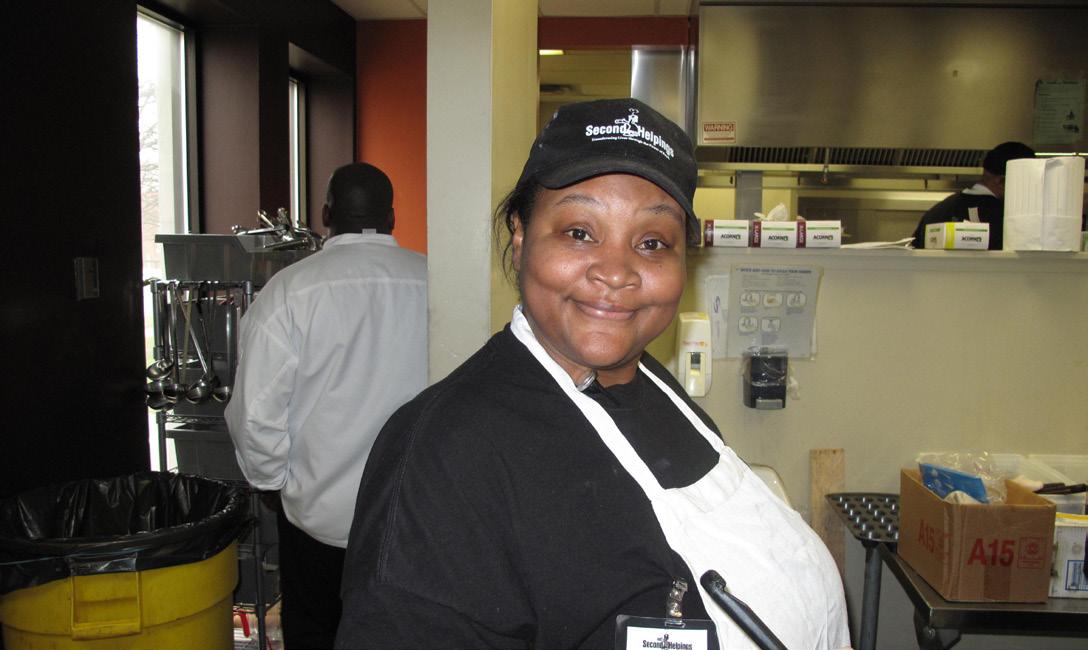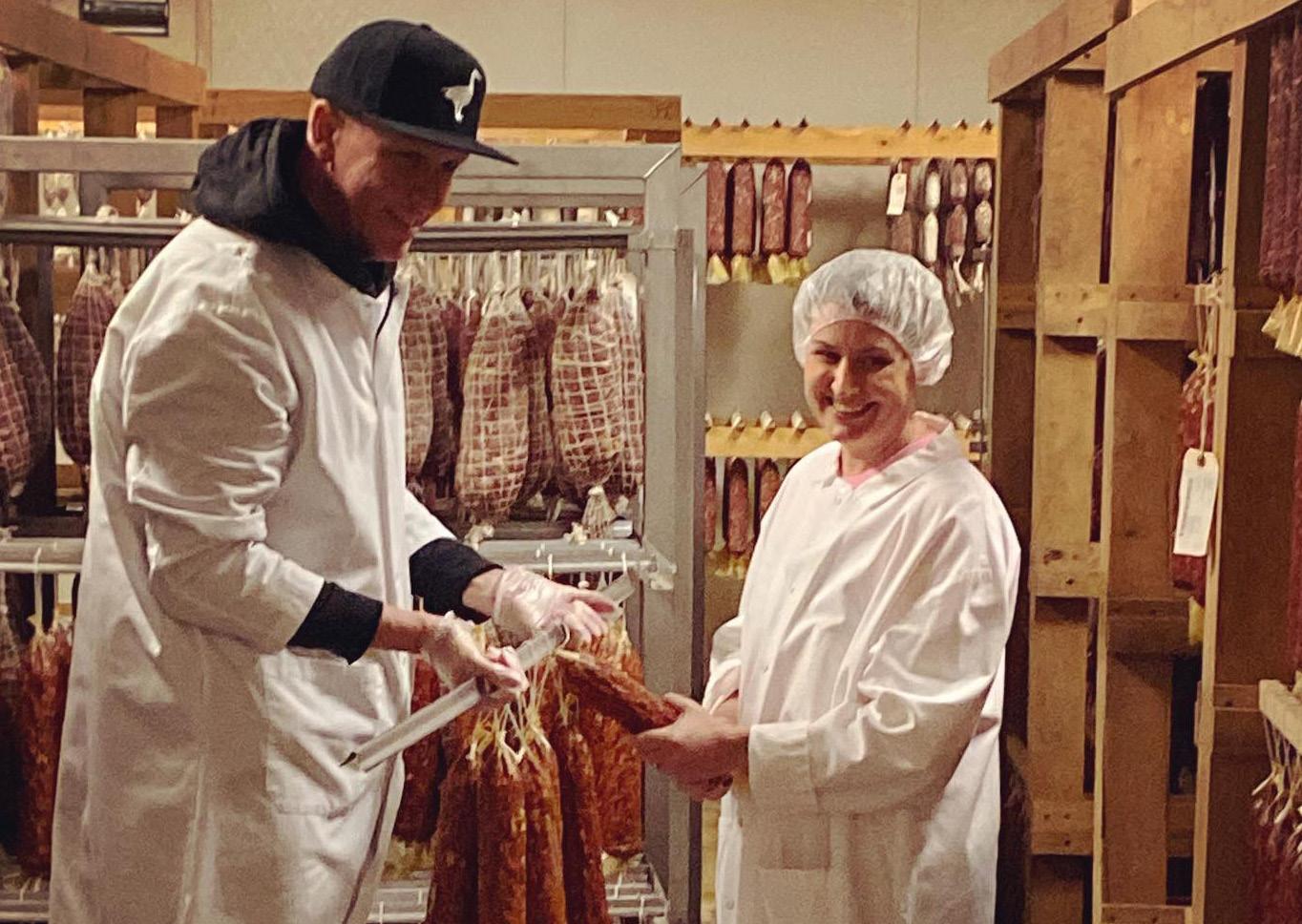How do we respond to community partners’ needs?
Take a look at the graph above. While it appears that we are serving around the same number of people today as we did before the COVID-19 pandemic, there’s more to the story. As our community partners’ needs have evolved, so has our response. Here’s what’s different:
Types of Meals Delivered
While the vast majority of the meals we delivered prepandemic were in pans, served in community settings, the demand for meals packaged in individual serving containers and sandwiches continues to reach new peaks. This trend speaks to the increasing demands on our partners’ staff and programs, who want to simplify meals, or do not have the means to heat and serve.
Increased Demand from Pantries
While the number of meals we deliver has returned to near pre-pandemic levels, the demand for food items (like packaged snacks, shelf-stable items, and excess ingredients we rescue) from pantry partners continues to grow. We distribute more than 200,000 pounds of food products to our partners each month.
New Requests from Smaller Organizations
Recently, requests from organizations wanting to begin a partnership with us are coming from smaller entities like group homes. These organizations may have seen
the demand for their services increase, felt a strain on their own food budget, or perhaps only recently learned about our programs.
While we can’t predict future trends around food insecurity, we are committed to meeting our community’s needs – as defined by the community itself.
Throughout our 2023-2025 Strategic Plan are strategies informed by our overall goal to serve as many people as possible in the best ways possible. Over the next few years, we’ll get increasingly deliberate about gathering and responding to feedback from partners, donors, volunteers, staff, and those who eat our food.
As prices for basic needs like food continue to rise, community support is critical to ensure we can continue evolving with our community’s needs. Thank you for your commitment to Second Helpings’ mission to address hunger today and build self-sufficiency to prevent hunger tomorrow.
Little Bites of Second Helpings News • Spring 2024
Culinary Job Training graduate runs partner agency kitchen
In 2013, Lawanzer “Lou” Perkins Johnson was looking for a fresh start. After 20 years of unfulfilling work in call centers, she knew there was a bigger purpose for her somewhere, something that could allow her to better support her children and prioritize her sobriety. When she learned about Second Helpings’ Culinary Job Training program, it felt like the answer she’d been searching for – she and her husband decided the program would be worth pursuing, “to really take a chance on turning something I love into a career.”

For Lou, the most important, and most challenging, part of this program was attendance. “If you’re not there, you’re behind. You have to be committed or this won’t work.” The award for perfect attendance continues to be one of the most coveted accomplishments celebrated at each Culinary Job Training graduation ceremony.
“The most valuable thing I learned was mise en place.” (This French term for “putting in place” is used in the culinary industry to describe the discipline and setup every chef needs to prepare before they start cooking.) “You need time management and structure. You have to have the right mindset. I’m always thinking about tomorrow, to make sure I have everything I need. Those ingredients translate to the rest of your life, and give you structure at home.”
Lou graduated with Class 71 in April 2013 – and went straight to work, accepting a job offer as a cook at the Ruth Lilly Women and Children’s Center, a Salvation
Army-managed facility in downtown Indianapolis that serves unhoused adults and families affected by domestic violence.
Less than a year later, she was promoted to Kitchen Manager. We recently caught up with Chef Lou, who’s celebrating more than 10 years serving the families at the Women and Children’s Center. She manages a staff of nine who prepare three meals a day for the families and individuals living there.
“I came here with a focus on nutrition. I want our food to be healthy, but still comforting and familiar. Food is good for the soul, too. We’re going to feed you physically, mentally, and spiritually here.”
Prioritizing comforting nutrition is critical in this environment, Lou explained. Clients staying at this facility may have come straight from an abusive situation or from being unhoused. Food can be an incredible comfort during a crisis, and families often have no way to provide that for themselves. Moreover, “homelessness and domestic violence don’t discriminate – they impact all cultures and can reach anyone,” Lou shared.
Food brings people together. New clients may avoid large group settings at first, but that means missing out on shared experiences and connecting with additional resources. But food is a great way to bring people in. “People come all the way down the hall to find out what’s happening in the cafeteria because the food smells so good,” Lou smiles.
In 2020, though, the Center’s food budget was cut. Lou knew her team could not sacrifice the quantity or quality of the meals they provided every day, that the families depended on those meals.
From both her experience as a Culinary Job Training student, and collaboration with other Salvation Army facilities who partnered with Second Helpings, Chef Lou knew exactly who to call.
Since 2020, Second Helpings has provided more than 70,000 meals and 55,000 pounds of additional food to the Salvation Army’s Ruth Lilly Women and Children’s Center.
This full-circle experience with Second Helpings “has
Since graduating with Culinary Job Training Class 71 in 2013, Lou Perkins has worked in the kitchen at the Ruth Lilly Women and Children’s Center, one of our partner agencies.
Culinary Job Training & Hunger Relief
been a blessing,” Chef Lou says. “It feels good to serve food from my alma mater, and I get to show off your food to all our amazing families.”
“Whenever we need anything, I know I can call Second Helpings. When I come in to redirect sessions, I see so many familiar faces. It’s a family, and it’s fun to stay
connected in a different way.”
When we asked Chef Lou to reflect on her culinary career, starting from an introductory program, to now supervising a team of nine, she was brought to tears.
“It feels amazing. I have met so many wonderful people, and I’m not done yet!”
Food Rescue
Smoking Goose’s support strengthens Second Helpings
Smoking Goose, in downtown Indianapolis, is a meatery that handcrafts a variety of products for wholesale distribution.
Throughout their 12-year history, this local producer has supported Second Helpings in a variety of ways. Since 2014, we have rescued more than 50,000 pounds of food from Smoking Goose including Capocollo di Dorman, City Ham, Hot Smoked Wagyu Beef Bologna, Applewood Smoked Bacon Bits, and more.
Protein donations are particularly valuable in our Hunger Relief kitchen, as it is often the most expensive ingredient in our meals and critical to ensure all our meals are nutritionally balanced.

This partnership stems from shared values. Corrie Cook, who serves as Smoking Goose’s Director of Narration, explains, “Smoking Goose and Second Helpings share in the belief that there’s room – and
a plate – for everyone at the table. Donating and volunteering to help address hunger relief is so closely tied to both food rescue and culinary training.”
“To help make sure everyone in our community is well fed, we need to make sure we’re making the most of our resources, and that means avoiding food waste and having the experience to know how to prepare ingredients. Smoking Goose is proud to support Second Helping’s multi-faceted approach to get good food to folks who need it.”
Beyond donating excess food items, Smoking Goose has also participated in our events, donating tickets for their Whole Hog Butchering Class to our Corks & Forks silent auction and competing in our Souper Bowls event.
Perhaps our favorite way for a local business to support Second Helpings is by hiring graduates of our Culinary Job Training program. Smoking Goose currently has three graduates on their team.
Piper Workman, a graduate of Class 151 in 2022, works as a chef in Smoking Goose’s Public Smokehouse, and served as their representative at Souper Bowls in February, preparing a spicy Snapdragon Soup.
Public Smokehouse manager Anna Efroymson says, “Piper’s education at Second Helpings has given her skill and insight along with culinary confidence and a discriminating palate.”
Thanks to Smoking Goose’s continued support, we can continue working towards our shared vision for a community where everyone has enough nourishing food and ample opportunities to thrive.
Local meatery Smoking Goose supports Second Helpings as a food donor, event participant, and Culinary Job Training employer.
The Eugene and Marilyn Glick Center
1121 Southeastern Ave. Indianapolis, IN 46202
secondhelpings.org
(317) 632-2664
Firstname Lastname and Firstname Lastname
9999 Streetname St
Indianapolis, IN 46202-0000
Join Second Helpings in the fight against hunger at Gainbridge Fieldhouse for Corks & Forks, presented by Kroger, in partnership with Pacers Sports & Entertainment and Levy Restaurants.
Enjoy food and drinks from top chefs and bartenders across central Indiana, silent auction, and more, all hosted by WRTV’s Marc Mullins. We hope you’ll join us for a special night to support Second Helpings’ Food Rescue, Hunger Relief, and Culinary Job Training programs. Each ticket purchase provides 90 meals for the central Indiana community.
Visit our website to purchase tickets and learn more about the event, including participating chefs and beverage partners.
secondhelpings.org/corksandforks
@SecondHelpingsIndy @SecondHelpings


This newsletter was printed on low-cost paper, manufactured using environmentally-friendly standards and containing post-consumer waste.
Follow Us on Social Media




